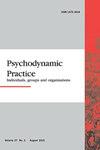无意识的声音:作为音乐的精神分析
IF 0.4
Q4 PSYCHOLOGY, CLINICAL
引用次数: 1
摘要
我想起了David Armstrong关于将精神分析应用于社会制度的反思(Armstrong, 2005)——除非一个人能够达到内在的社会空间的动态情感体验,否则它有可能成为一个空洞的概念。领导力的类型学以及围绕这些类型学的讨论让我们走了这么远,但麦考比提到的变化、威胁和机遇需要更广泛的范围。本文章由计算机程序翻译,如有差异,请以英文原文为准。
The sound of the unconscious: psychoanalysis as music
I am reminded though of David Armstrong’s reflections on the application of psychoanalysis to social institutions (Armstrong, 2005) – that it risks being an empty concept unless one can reach for dynamic emotional experience that is immanent in the social space. Typologies of leadership, and the discussions around them take us so far, but the change, threats and opportunities that Maccoby refers to require a wider ambit.
求助全文
通过发布文献求助,成功后即可免费获取论文全文。
去求助
来源期刊

Psychodynamic Practice
PSYCHOLOGY, PSYCHOANALYSIS-
CiteScore
0.90
自引率
0.00%
发文量
41
期刊介绍:
Psychodynamic Practice is a journal of counselling, psychotherapy and consultancy and it is written for professionals in all fields who use psychodynamic thinking in their work. The journal explores the relevance of psychodynamic ideas to different occupational settings. It emphasizes setting and application as well as theory and technique and focuses on four broad areas: •Clinical practice •The understanding of group and organisational processes •The use of psychodynamic ideas and methods in different occupational settings (for example, education and training, health care, social work, pastoral care, management and consultancy) •The understanding of social, political and cultural issues
 求助内容:
求助内容: 应助结果提醒方式:
应助结果提醒方式:


